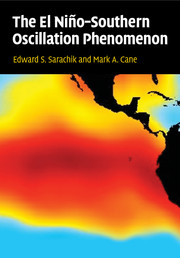Book contents
- Frontmatter
- Contents
- Preface
- List of abbreviations
- 1 Preview
- 2 The observational basis
- 3 The equations of motion and some simplifications
- 4 Boundary layers on both sides of the tropical ocean surface
- 5 Atmospheric processes
- 6 Ocean processes
- 7 ENSO mechanisms
- 8 ENSO prediction and short-term climate prediction
- 9 ENSO, past and future: ENSO by proxy and ENSO in the tea leaves
- 10 Using ENSO information
- 11 Postview
- Appendix 1 Some useful numbers
- Appendix 2 The parabolic-cylinder functions
- Appendix 3 Modal and non-modal growth
- References
- Index
6 - Ocean processes
Published online by Cambridge University Press: 25 January 2011
- Frontmatter
- Contents
- Preface
- List of abbreviations
- 1 Preview
- 2 The observational basis
- 3 The equations of motion and some simplifications
- 4 Boundary layers on both sides of the tropical ocean surface
- 5 Atmospheric processes
- 6 Ocean processes
- 7 ENSO mechanisms
- 8 ENSO prediction and short-term climate prediction
- 9 ENSO, past and future: ENSO by proxy and ENSO in the tea leaves
- 10 Using ENSO information
- 11 Postview
- Appendix 1 Some useful numbers
- Appendix 2 The parabolic-cylinder functions
- Appendix 3 Modal and non-modal growth
- References
- Index
Summary
This chapter deals with the ocean processes needed to understand the interaction of the ocean with the atmosphere in the tropics. Since the interaction between the atmosphere and the ocean occurs entirely at the surface, through the interchange of heat, water and momentum fluxes, the key quantity the ocean provides is the sea-surface temperature (SST). The chapter opens with a discussion of the upper-ocean processes that change SST and rapidly focuses in on the effects of upwelling on the upper-ocean stratification, as indexed by the depth of the tropical thermocline. Upwelling is easily calculated from frictional processes near the surface but the change in the depth of the thermocline is a subtle process that responds mostly to wind stresses at the surface.
The time-dependent response of the thermocline to wind stresses is treated in a number of simplified contexts. As an introductory example, the non-divergent (barotropic) case is worked out in some detail. The steady interior solution in this case is the Sverdrup solution, where the curl of the wind stress balances the meridional mass transport. How the Sverdrup relation is set up in a time-dependent manner is demonstrated and the role of both viscous and inviscid western-boundary layers in balancing the vorticity constantly put in by the curl of the wind stress is considered. The signaling properties (carried by signal fronts having properties of waves) that tell parts of the basin whether forcing is either present or absent is emphasized, and the common misunderstanding of the sense in which waves are present is discussed in some detail.
- Type
- Chapter
- Information
- The El Niño-Southern Oscillation Phenomenon , pp. 185 - 234Publisher: Cambridge University PressPrint publication year: 2010



